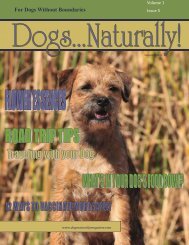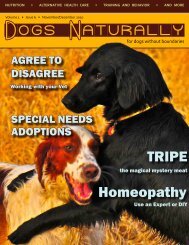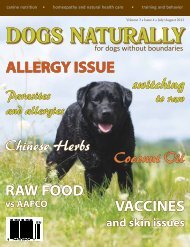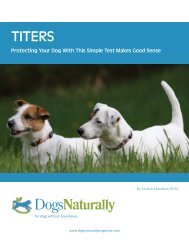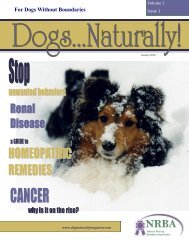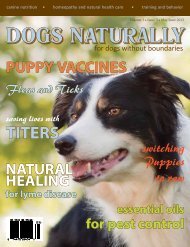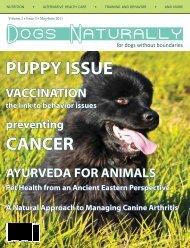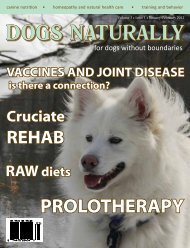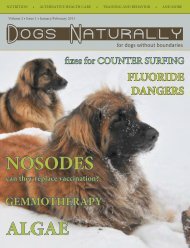July/August 2010 - Dogs Naturally Magazine
July/August 2010 - Dogs Naturally Magazine
July/August 2010 - Dogs Naturally Magazine
You also want an ePaper? Increase the reach of your titles
YUMPU automatically turns print PDFs into web optimized ePapers that Google loves.
y: Erika Phillips<br />
We are what we eat. Raw feeders take this simple statement<br />
very seriously and eschew kibble for its dubious origins and<br />
questionable ingredients. We rightly feel more comfortable<br />
feeding foods to our dogs with known origins: we like to know<br />
not only what foods are going into our dogs but where they<br />
came from. Unfortunately, we might not know as much about<br />
the origin of feed animals as we should.<br />
The Times They are A-Changing ~Bob Dylan<br />
For generations our food has been raised on soils rich in nutrients.<br />
Cows ate grass, sheep ate grass. Chickens ranged and<br />
ate worms and frogs and other meaty morsels rich with protein<br />
necessary to produce wonderfully nutritious eggs. Pigs<br />
received 80% of their nutritional requirements from rich and<br />
living soil. Life was simpler and life was in our nutrient-dense<br />
leaner and lower in calories, and higher in omega-3 fatty acids<br />
food. Sadly, this does not ring true today: cows are now grain<br />
and vitamin E. Grass-fed dairy products also have five times<br />
fed with many of them never seeing a blade of grass, chickens<br />
the levels of conjugated linoleum acid (CLA) than their grain-<br />
are grain fed and factory raised without sunshine and never<br />
fed counterparts. Grass fed cows also convert Chlorophyll that<br />
seeing a bug or a worm, pigs are raised in concrete buildings<br />
they get from grass into Vitamin D that they get from the sun<br />
and sheep are normally pastured but too expensive to eat.<br />
which in turn produces vitamin A found in the liver and other<br />
The ramifications of industrialized farming have very real<br />
health implications for us and for our dogs.<br />
organs. Without grass Cow’s are not worth eating!<br />
On factory beef farms the staple of the cow’s diet is corn and<br />
soy which are not well digested by cows. In fact, cattle can<br />
The cow is nothing but a machine which makes grass fit for us develop severe health problems from grains, some of which<br />
people to eat. ~John McNulty<br />
include liver abscesses and sudden death syndrome. For filler,<br />
Cows are ruminants, and ruminants are designed by nature to<br />
digest grass and only grass. They digest it first by eating it raw<br />
and then by regurgitating it and eating it again in a partially<br />
digested form known as cud. As ruminants, cows have four<br />
chambers in their stomachs, and as a cow digests, the food<br />
moves slowly from one chamber to the next.<br />
factory farms will also add animal by-products to industrial<br />
cattle feed, and these additions can transmit diseases like mad<br />
cow to both animals and humans. Grains ferment in the stomach<br />
and create serious bacteria overloads including salmonella<br />
and e-coli. In large production facilities where the animals<br />
stand and sleep in their feces, the bacterium is spread<br />
throughout the herd and when the time comes for slaughter<br />
Raising cattle on pasture not only makes sense for their diges- the feces/bacteria often remain in the meat unless bleached.<br />
tive systems, but makes sense for humans too, by turning On top of that, run-off from factory farms and feedlots can<br />
something we can’t eat (grass) into something we can (meat) contaminate surrounding crops with salmonella and e-coli and<br />
and dairy products. Cattle raised on grass provide meat that is this has resulted in numerous illnesses and recalls.<br />
<strong>Dogs</strong>...<strong>Naturally</strong>! <strong>July</strong>/<strong>August</strong> <strong>2010</strong>



